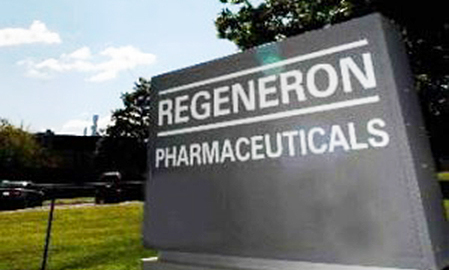Regeneron’s launch into genetic sequencing was more of a blastoff than a quiet entry: the Tarrytown, NY, drugmaker announced Monday in two separate statements that it had not only established the subsidiary Regeneron Genetics Center to explore human genetics, but that it had also inked a five-year collaboration deal with Pennsylvania-based Geisinger Health System.
Although Regeneron said in a statement that the new genetics unit is also partnering up with the National Institutes of Health’s National Human Genome Research Institute, the company said the Geisinger deal is the heart of the genome exploration.
Under the agreement, 100,000 Geisinger patients will hand over their DNA for sequencing. The goal is to be able to find relationships between genes and human disease, furthering the development of personalized medicine. The idea of using genetics to tailor treatments is not new, but researchers are still stuck in a wading-through phase that involves not just sequencing DNA but understanding the data and then converting that understanding into an applicable use.
Merck’s R&D chief, Roger Perlmutter, discussed this issue at a Forbes health conference last fall, adding that genomics is just the beginning and that researchers are also going to need to dive into proteins themselves. This is not to say that top-level genetic information will not be helpful, but is an indication that genes in and of themselves are not the end of the exploration.
A February 2013 post on the Centers for Disease Control & Prevention’s Genomics and Health Impact blog also discussed the potential of being able to pick apart the genome, but indicated that the small, well-defined groups are the immediate beneficiaries of these early genetic findings.
As an example, the CDC notes that genetic screening can help researchers divide patient populations based on genetic risks for certain conditions, and then create screening regimens for these discrete groups. In the February 2013 example, the patient group consisted of women, using the BRCA gene as a barometer for breast and ovarian cancer risk.
The US Preventive Services Task Force currently recommends women with ovarian and breast cancer family histories be screened. The CDC said that it may be possible to create a “rational scenario” for treatment based on genetic information combined with possible age-related risks, but that more data is needed to identify all of the variables—including genetic information—that can affect a patient’s health before coming up with the idea of stratified risk that will address a larger population.
Despite the what-ifs, Monday’s news is not a first-plunge for Regeneron. The company is already knee-deep in a research deal with Sanofi to develop the first approved PCSK9 cholesterol-lowering drug.








